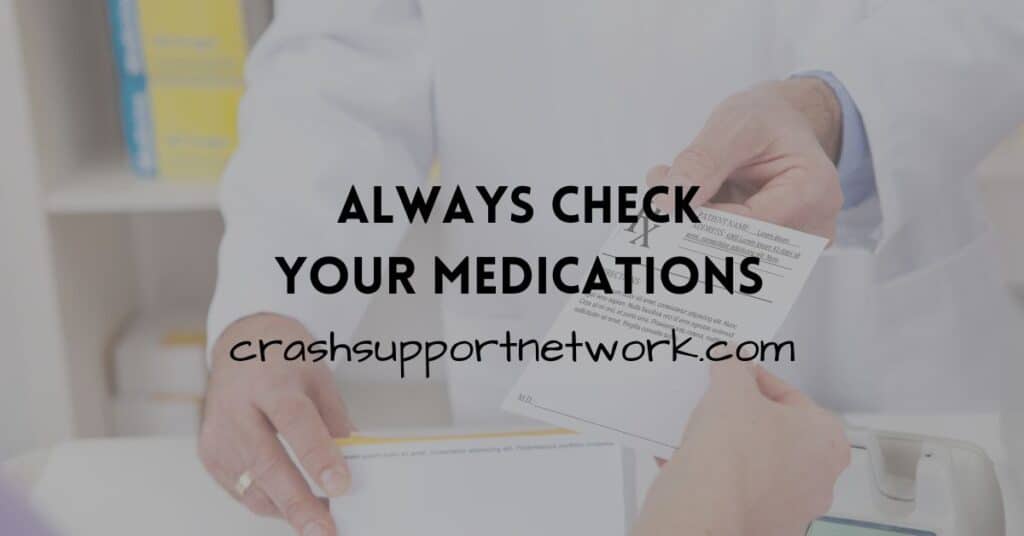
As we recover from a motor vehicle crash, a vast majority of us will be given medications while we are in the hospital for various reasons and once discharged, many of us will be given a handful of scripts to fill at the pharmacy as we return home or to a rehabilitation clinic. At the time of my crash, my doctor’s office was well over an hour drive and she decided to be helpful and fill a large quantity prescription on my behalf so I wouldn’t have to visit her as often as it was difficult. I was immobile, in terrible pain and needed a lot of care. It was wonderful that she did this on my behalf but at the same time, I was not aware that within a couple of months, I would find myself realizing that I would need to start deceasing the doses. Now I am not a medical professional in any means and can only speak to you on my personal experience as a crash survivor taking pain medications.
What is a prescription (RX)?
A prescription is a formal request from a health care professional to a pharmacist authorizing them to dispense a specific drug to a specific patient.
Every time you get a new prescription, make sure you:
- Tell your health care provider about any allergies or side effects, you have had to any medicines in the past.
- Tell all your providers about all the medicines, supplements, and herbs you take. Bring a list of all your medications to your appointments.
- Ask what each medicine is for and what side effects to watch for.
- Ask whether the medicine will interact with any foods, drinks, or other medicines.
- Ask your provider what to do if you forget a dose.
- Learn the names of all your medicines. It’s also very important to learn what each medicine looks like.
Pain Management is Important
I remember vaguely, speaking to a friend of mine that was a nurse about two months into my recovery and she was asking me how I was feeling. She also asked me what medications I was taking and she casually mentioned “you realize that you have to ween yourself off of the meds right?” I remember being confused at the time as I had no clue what she was talking about. She explained to me that even though the prescription said “three times a day and as needed”, didn’t actually mean I had to continue taking the medication three times a day and that I would need to pay close attention to my pain management.
She asked me if I had tried delaying taking a pill as of yet to which I responded “no”. The more I thought about it as I was on the phone with her, the more it started to make sense to me. You see, I was under the impression that I had to continue taking the pain meds three times a day whether I needed them or not and part of me actually thought I would keep taking them until the bottle was empty and I would then call my family doctor to get a refill. I don’t think anyone explained this to me at the time at least I don’t remember. What she was telling me made sense. Of course I couldn’t stay on these pain meds for the rest of my life! I was so grateful to her for telling me this. After that phone call, I did in fact start to decrease my doses and eventually stopped all together. It took time but I was truly grateful that she mentioned this to me.
Check Your Prescriptions
Whether you or a family member are picking up your prescription, it is imperative that you always check the prescription itself to make sure your name is on it. Never take it for granted that the pharmacist will be correct as sometimes errors are made.
Make Sure it’s the Right Prescription
Most recently, I went to my local pharmacy to pick up two different medications. When I opened the bag, I checked to make sure my name was there but something else caught my eye. I was holding two bottles of medication that were holding identical pills. I knew this because I know the colour of the pills I am taking. They had mistakenly put the same medication in both bottles with different labels but one bottle did not contain the right medication. If I hadn’t noticed, it could have potentially been a huge health concern for me.
Medication Tips
When you receive your prescription, always:
- Check the label. Look for your name, the name of the medicine, the dose, and how often you should take it. If something looks unfamiliar, call your provider.
- Look at the medicine. Make sure it looks the same as what you have been taking. If it does not, call the pharmacist or your provider. It may look different because it is a generic version or a different brand. However, you should always check to make sure it is the same medicine before you take it.
- Take and store medicines safely. When taking medications at home, store them properly and keep them organized and out of reach of children. Following a regular medicine routine will also help make sure you get the proper dose at the right time.
Filling a new prescription is just the first step in our recovery journey. We are often left to advocate for ourselves so it’s important to follow up with your doctor or specialist to evaluate how well the medication is working for you. I cannot stress it enough how important it is to check every prescription you pick up because your health depends on it!
S. Dawne McKay is a survivor of a horrific crash that changed her life forever. Dawne shares her personal journey as a Crash Survivor Blogger and also collaborates with crash survivors as Guest Bloggers allowing them an opportunity to share their stories. Dawne is also the author of the book, “Talk Crash to Me – What to Expect After Surviving a Collision and How to Manage Your Recovery” which is available for purchase on Amazon.
The Crash Support Network is a unique one-of-a-kind website consisting of an online support group, a crash survivor blog, a quarterly newsletter, “Sharing Our Recovery” as well as highly informative articles. Our website is based on relationship-building and puts the needs of survivors first by creating a helpful resource for victims and survivors of motor vehicle crashes.



